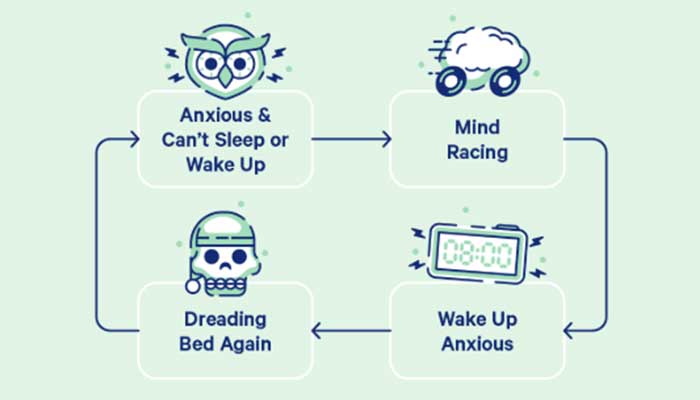
The fear of sleep or the inability to fall asleep because of anxiety about it is called sleep anxiety or somniphobia. Insomnia, exhaustion, and a variety of other mental and physical health issues can result from this crippling illness. Thankfully, you can overcome sleep anxiety and regain peaceful nights if you adopt the appropriate techniques and attitude. This guide gives a comprehensive overview of sleep anxiety and offers helpful advice on how to control and get rid of it.
What is Sleep Anxiety?
Excessive concern about sleep-related problems is frequently the root cause of sleep anxiety. You might worry about having trouble falling asleep, remaining up all night, or experiencing the negative effects of inadequate sleep. This sets up a vicious cycle in which insomnia is brought on by anxiety about sleep, which in turn makes the anxiety worse.
Causes of Sleep Anxiety
- Stress and Overthinking
Sleep anxiety might be a symptom of ongoing concerns about relationships, the workplace, or other aspects of life.
- Past Trauma
Fear of sleeping can be brought on by unpleasant sleep-related experiences such as nightmares or sleep disorders.
- Sleep Disorders
Disorders such as sleep apnea or insomnia can make people more anxious before bed. Anxiety related to sleep is more common in people with Generalized Anxiety Disorder (GAD).
Symptoms of Sleep Anxiety
- Having racing thoughts right before bed.
- Having trouble falling or staying asleep.
- Having a fast heartbeat, perspiration, or restlessness right before bed.
- Feeling exhausted and agitated during the day.
- Avoiding sleep or making up reasons to put off going to bed.
Steps to Overcome Sleep Anxiety
1. Create a Calm Nighttime Schedule
Establishing a relaxing pre-sleep routine lets your body and mind know it’s time to relax.
- Dim the Lights
The hormone that causes sleep which is melatonin, is produced by your body more readily when there is less light present.
- Put Relaxation Techniques into Practice
Read, meditate, or practice gentle yoga.
- Steer Clear of Stimulating Activities
An hour before bed, avoid working, watching action-packed movies, or using electronics.
2. Establish an Environment that Promotes Sleep
One important factor in reducing sleep anxiety is your sleeping environment.
- Comfy Mattress and Pillows
Make sure your bedding promotes comfort and proper posture.
- Dark, Quiet, and Cool Room
To reduce noise, use white noise generators, earplugs, or blackout curtains.
- Clear Your Space
A neat bedroom can promote relaxation.
3. Dispel Adverse Thoughts
Catastrophic thinking is often the breeding ground for sleep anxiety. Substitute logical and comforting thoughts for these.
- Maintain a Thought Journal
To offload your worries, write them down before bed.
- Cognitive Behavioral Therapy or CBT
Collaborate with a therapist to recognize and question false beliefs about sleep. Recite soothing statements such as “I am safe and capable of relaxing” to shift your perspective.
4. Minimize Sleep Disruptors and Stimulants
Your sleep at night is influenced by the things you eat and do during the day.
- Steer Clear of Caffeine and Nicotine
These stimulants can delay the onset of sleep by remaining in your system for hours.
- Limit Alcohol
Although it may make you feel drowsy at first, alcohol interferes with your sleep cycles.
- Pay Attention to Your Diet
Energy spikes or discomfort can result from heavy meals or sugary snacks right before bed.
5. Develop Restful Sleeping Patterns
The secret to conquering sleep anxiety is consistency.
- Maintain a Sleep Schedule
Even on the weekends, go to bed and wake up at the same time each day.
- Prevent Daytime Naps
Steer clear of late-day naps and keep them to no more than 20 to 30 minutes.
- Get Regular Exercise
Getting some exercise early in the day can help you sleep better.
6. Use Mindfulness and Relaxation Techniques
You can lower anxiety and calm your nervous system by practicing relaxation techniques.
- Deep Breathing Exercises
To lower your heart rate and lessen stress, concentrate on taking slow and deep breaths.
- Progressive Muscle Relaxation (PMR)
From your toes to your head, tense and relax each muscle group.
- Guided Imagery
Picture serene landscapes like a tranquil forest or beach.
7. Make Good Use of Technology
Some technologies can help people relax, but too much screen time can make sleep anxiety worse.
- Sleep Apps
Look into apps that provide calming sounds, sleep stories, or guided meditation.
- Blue Light Filters
Use blue light-blocking glasses or activate blue light filters if you must use electronics right before bed.
8. Seek a Professional Assistance if Needed
It might be time to see a professional if your sleep anxiety doesn’t go away after trying self-help techniques.
- Treatment
For anxiety related to sleep, Cognitive Behavioral Therapy for Insomnia (CBT-I) is a very successful treatment.
- Medication
To treat extreme anxiety or insomnia, a doctor might occasionally recommend short-term medication.
- Sleep Studies
A sleep study can shed light on suspected underlying conditions like sleep apnea.
Develop a Long-Term Resistance to Sleep Anxiety
Recognize that Occasional Sleep Loss is Common
It’s crucial to keep in mind that occasionally skipping a night of sleep won’t negatively impact your productivity or health. You might feel less pressure to achieve perfect sleep after coming to this realization.
Develop a Growth Mentality
Think of sleep anxiety as a short-term obstacle that you can conquer. Honor minor accomplishments like getting to sleep more quickly or feeling more rested.
Put Your General Well-Being First
A healthy lifestyle lowers anxiety and promotes better sleep.
- Balanced Diet
To support your body and mind, eat wholesome meals.
- Social Connections
To reduce stress, spend time with family and friends who are encouraging.
- Hobbies and Leisure
Take part in enjoyable activities to distract yourself from concerns about sleep.
Useful Advice for Quick Relief
If you are unable to fall asleep after 20 minutes, get out of bed and do something calming in a dimly lit area until you feel sleepy.
- Develop Gratitude
To divert your attention from anxiety, consider the good things that happened during the day.
- Listen to Calm Sounds
To help you unwind, play soft music, white noise, or rain.
It takes self-compassion, perseverance, and patience to overcome sleep anxiety. You can overcome sleep anxiety and develop a positive relationship with sleep by putting the techniques in this guide into practice. Keep in mind that setbacks are common and that progress might take time. Ask for help when you need it and have faith in your ability to get a good night’s sleep.

Leave a Reply